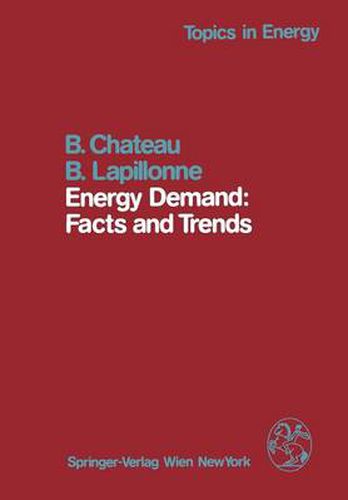Readings Newsletter
Become a Readings Member to make your shopping experience even easier.
Sign in or sign up for free!
You’re not far away from qualifying for FREE standard shipping within Australia
You’ve qualified for FREE standard shipping within Australia
The cart is loading…






This title is printed to order. This book may have been self-published. If so, we cannot guarantee the quality of the content. In the main most books will have gone through the editing process however some may not. We therefore suggest that you be aware of this before ordering this book. If in doubt check either the author or publisher’s details as we are unable to accept any returns unless they are faulty. Please contact us if you have any questions.
The fIrst oil crisis of 1973-74 and the questions it raised in the economic and social fIelds drew attention to energy issues. Industrial societies, accustomed for two decades or more to energy sufficiently easy to produce and cheap to consume that it was thought to be inexhaustible, began to question their energy future. The studies undertaken at that time, and since, on a national, regional, or world level were over-optimistic. The problem seemed simple enough to solve. On the one hand, a certain number of resources: coal, the abundance of which was discovered, or rather rediscovered oil, source of all the problems … In fact, the problems seemed to come, if not from oil itself (an easy explanation), then from those who produced it without really owning it, and from those who owned it without really control ling it natural gas, second only to oil and less compromised uranium, all of whose promises had not been kept, but whose resources were not in question solar energy, multiform and really inexhaustible thermonuclear fusion, and geothermal energy, etc. On the other hand, energy consumption, though excessive perhaps, was symbolic of progress, development, and increased well being. The originality of the energy policies set up since 1974 lies in the fact they no longer aimed to produce (or import) more, but to consume less. They sought, and still seek, what might be emphatically called the control of energy consump tion, or rather the control of energy demand.
$9.00 standard shipping within Australia
FREE standard shipping within Australia for orders over $100.00
Express & International shipping calculated at checkout
This title is printed to order. This book may have been self-published. If so, we cannot guarantee the quality of the content. In the main most books will have gone through the editing process however some may not. We therefore suggest that you be aware of this before ordering this book. If in doubt check either the author or publisher’s details as we are unable to accept any returns unless they are faulty. Please contact us if you have any questions.
The fIrst oil crisis of 1973-74 and the questions it raised in the economic and social fIelds drew attention to energy issues. Industrial societies, accustomed for two decades or more to energy sufficiently easy to produce and cheap to consume that it was thought to be inexhaustible, began to question their energy future. The studies undertaken at that time, and since, on a national, regional, or world level were over-optimistic. The problem seemed simple enough to solve. On the one hand, a certain number of resources: coal, the abundance of which was discovered, or rather rediscovered oil, source of all the problems … In fact, the problems seemed to come, if not from oil itself (an easy explanation), then from those who produced it without really owning it, and from those who owned it without really control ling it natural gas, second only to oil and less compromised uranium, all of whose promises had not been kept, but whose resources were not in question solar energy, multiform and really inexhaustible thermonuclear fusion, and geothermal energy, etc. On the other hand, energy consumption, though excessive perhaps, was symbolic of progress, development, and increased well being. The originality of the energy policies set up since 1974 lies in the fact they no longer aimed to produce (or import) more, but to consume less. They sought, and still seek, what might be emphatically called the control of energy consump tion, or rather the control of energy demand.